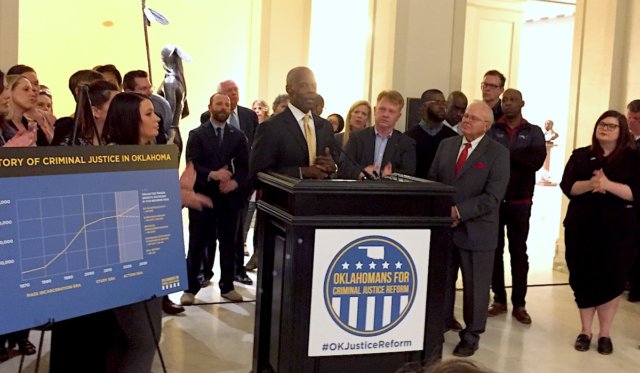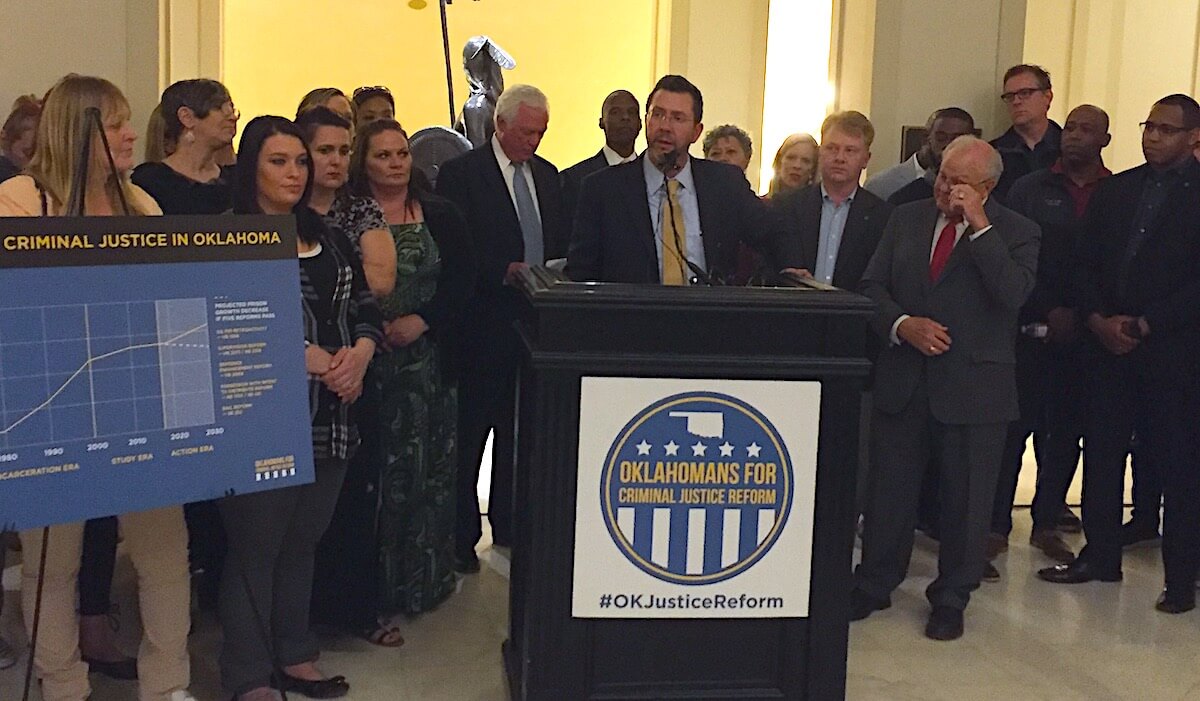

A large coalition of criminal justice reform advocates rallied Tuesday on the second floor of the Oklahoma State Capitol, clapping and cheering as speakers touted five pieces of legislation they say would end state prison growth in coming years.
“I think I am speaking for the Oklahoma business community as well when I say we support these reforms,” said Roy Williams, president and CEO of the Greater Oklahoma City Chamber of Commerce. “This impacts our work space and our workforce in multiple ways. Locking people up for offenses that are now misdemeanors is really crippling our workforce because these people should be at work, and our employers need them.”
Williams and Kris Steele, Oklahomans for Criminal Justice Reform executive director, praised legislative leaders and Gov. Kevin Stitt for supporting their attempts to curb prison growth. Williams noted Stitt’s infamous desire to make Oklahoma a top-10 state.
“I don’t believe being number one in incarceration is going to help us achieve that aspiration,” Williams said. “We are not here because someone else did this to us, so we need to own up to that.”
Watts: ‘A wealth of talent’ being wasted in prison
While Steele and OCJR have held similar press conferences before, Tuesday’s featured passionate advocacy from a former member of U.S. Congress: Republican J.C. Watts.
“This is the time for us to pass common sense reforms in the state of Oklahoma,” Watts said, adding that he has been focused on criminal justice reform for more than two decades. “[Meeting with people in prison], I noticed there was a wealth of talent we were wasting because we didn’t have the courage to vote for common sense reforms.”
Watts harkened back to 1996 when he voted with Democrats in Congress to address sentencing disparities between powder cocaine and crack cocaine.
“Powder cocaine was used by Wall Street folks, crack cocaine was used by poor folks. The sentencing disparity was 20 to 1,” Watts said.
Raised in a poor neighborhood of McIntosh County, Watts emphasized that incarcerated Oklahomans have potential as productive citizens. He pulled out a $5 bill and asked those in the audience to imagine what would happen to the bill if he took it outside, dragged it through mud and stomped on it.
“There’s not a person in this Capitol — there’s not a legislator in this Capitol — that would turn down taking this $5,” Watts said. “Why is that? Because this $5 — in spite of the fact that its soiled and it’s muddy and it’s stomped on and it’s torn — it still has value.”
Before Watts offered his analogy, small business owner Rhonda Bear stood at the podium and reminded Oklahomans of her value. After her release from prison, Bear started a coffee shop to employ people transitioning out of incarceration.
“When I walked out of prison, I had a box of books, I had $50 and I had a label called felon,” Bear said. “Do you know how hard it is to get your children back when you can’t get a job? When you are turned down for housing because you checked the box labeled felon? When you can’t get accepted into a state college without a fight?”
She said she recently spoke to a woman in prison serving 20 years for crimes related to drug addiction.
“That will cost the state almost $500,000, and she’s got three children in foster care,” Bear said. “It would have cost less money to go to Betty Ford for rehab for $30,000 a month, and it would have saved a family.”
Steele: ‘This is a pivotal moment’

Steele expressed optimism that Oklahoma could end its ranking as No. 1 in the nation for incarceration.
“This is a pivotal moment in Oklahoma’s history,” he said. “This session, five safe reforms can do something we have not been able to do in more than 50 years in Oklahoma: stop prison growth.”
Steele listed his organization’s priority bills:
- HB 1269 would apply State Question 780’s reforms retroactively to certain incarcerated offenders;
- HB 2273 and HB 2218 would reform district attorney supervision rules;
- HB 2009 would reform sentence enhancement statutes;
- HB 1100 would reform possession with intent to distribute rules;
- SB 252 would reform bail practices
Senate President Pro Tempore Greg Treat (R-OKC) said Monday that he had just met with Oklahomans for Criminal Justice Reform advocates.
“I had a good dialogue with them,” Treat said. “I still remain very committed to implementing the fourth point of our agenda.”
That point in the Senate Republican agenda was described in a January press release: “Oklahoma Senate Republicans will improve access to and provide funding for diversion programs to further criminal justice reform.”
District attorneys oppose parts of proposals
Brian Hermanson, chairman of the Oklahoma District Attorneys Council and president of the Oklahoma District Attorneys Association, said state prosecutors believe any retroactivity of SQ 780 should be implemented through the Pardon and Parole Board process. HB 1269 currently would direct “each court” in the state to set aside verdicts for covered crimes and require courts to “resentence” the offenders as if their crimes had occurred after July 1, 2017, when SQ 780 took effect.
“We would also rather see more money spent in the area of mental health, in the area of education, in the area of job training,” said Hermanson, who represents DA District 8 covering Kay and Noble counties. “It’s the failure of preventing crime that is creating the huge numbers in prison, and many of the people in prison are people who have committed crime after crime after crime. It’s only by us stopping that cycle that we can get a result that is favorable.”
Oklahoma County District Attorney David Prater echoed Hermanson’s concerns about “process” in the SQ 780 retroactivity bill.
“We’ve tried to have conversations with bill authors involved and every time our concerns fall on deaf ears,” Prater said. “Law enforcement generally and victims of crime have been left out of the justice conversation.”
Steele said he believes the Legislature is interested in passing the reforms his group supports, despite objections from prosecutors.
“We have reached out to prosecutors who oppose these reforms and have tried to ask for meetings to talk about their concerns,” Steele said. “The reality is they have not taken us up on those offers. They just continue to try to work against (us) to oppose other reforms.”
Hermanson offered a different story.
“I have met with them,” Hermanson said. “We haven’t met recently. I haven’t had a request recently. My phone line is always available to Kris Steele if he would like to get something together.”
(Editor’s note: Oklahomans for Criminal Justice Reform has purchased advertising on NonDoc in 2019.)




















